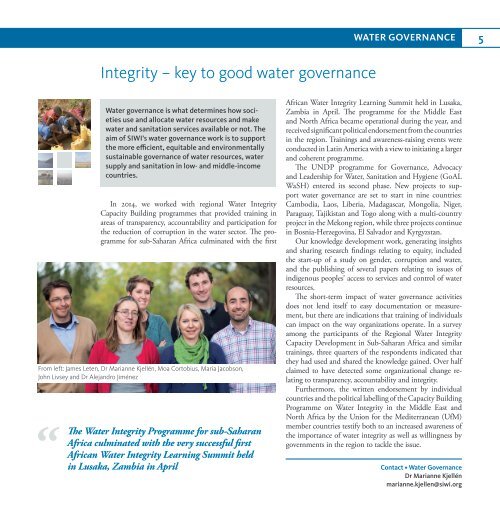2014 Annual Report
Create successful ePaper yourself
Turn your PDF publications into a flip-book with our unique Google optimized e-Paper software.
WATER GOVERNANCE<br />
5<br />
Integrity – key to good water governance<br />
Water governance is what determines how societies<br />
use and allocate water resources and make<br />
water and sanitation services available or not. The<br />
aim of SIWI’s water governance work is to support<br />
the more efficient, equitable and environmentally<br />
sustainable governance of water resources, water<br />
supply and sanitation in low- and middle-income<br />
countries.<br />
In <strong>2014</strong>, we worked with regional Water Integrity<br />
Capacity Building programmes that provided training in<br />
areas of transparency, accountability and participation for<br />
the reduction of corruption in the water sector. The programme<br />
for sub-Saharan Africa culminated with the first<br />
From left: James Leten, Dr Marianne Kjellén, Moa Cortobius, Maria Jacobson,<br />
John Livsey and Dr Alejandro Jiménez<br />
The Water Integrity Programme for sub-Saharan<br />
Africa culminated with the very successful first<br />
African Water Integrity Learning Summit held<br />
in Lusaka, Zambia in April<br />
African Water Integrity Learning Summit held in Lusaka,<br />
Zambia in April. The programme for the Middle East<br />
and North Africa became operational during the year, and<br />
received significant political endorsement from the countries<br />
in the region. Trainings and awareness-raising events were<br />
conducted in Latin America with a view to initiating a larger<br />
and coherent programme.<br />
The UNDP programme for Governance, Advocacy<br />
and Leadership for Water, Sanitation and Hygiene (GoAL<br />
WaSH) entered its second phase. New projects to support<br />
water governance are set to start in nine countries:<br />
Cambodia, Laos, Liberia, Madagascar, Mongolia, Niger,<br />
Paraguay, Tajikistan and Togo along with a multi-country<br />
project in the Mekong region, while three projects continue<br />
in Bosnia-Herzegovina, El Salvador and Kyrgyzstan.<br />
Our knowledge development work, generating insights<br />
and sharing research findings relating to equity, included<br />
the start-up of a study on gender, corruption and water,<br />
and the publishing of several papers relating to issues of<br />
indigenous peoples’ access to services and control of water<br />
resources.<br />
The short-term impact of water governance activities<br />
does not lend itself to easy documentation or measurement,<br />
but there are indications that training of individuals<br />
can impact on the way organizations operate. In a survey<br />
among the participants of the Regional Water Integrity<br />
Capacity Development in Sub-Saharan Africa and similar<br />
trainings, three quarters of the respondents indicated that<br />
they had used and shared the knowledge gained. Over half<br />
claimed to have detected some organizational change relating<br />
to transparency, accountability and integrity.<br />
Furthermore, the written endorsement by individual<br />
countries and the political labelling of the Capacity Building<br />
Programme on Water Integrity in the Middle East and<br />
North Africa by the Union for the Mediterranean (UfM)<br />
member countries testify both to an increased awareness of<br />
the importance of water integrity as well as willingness by<br />
governments in the region to tackle the issue.<br />
Contact • Water Governance<br />
Dr Marianne Kjellén<br />
marianne.kjellen@siwi.org


















